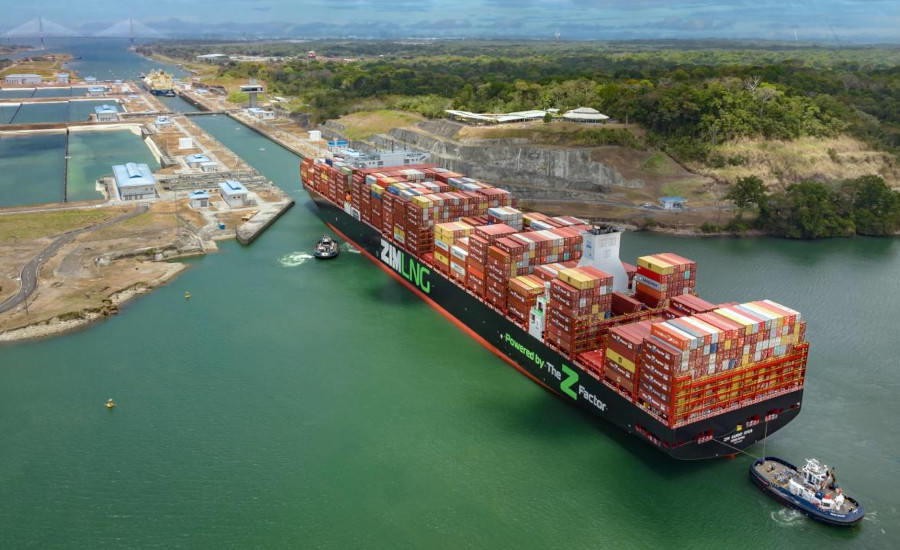A long-running legal battle over the concrete used in construction of the Panama Canal's third lane expansion locks has reached its end in U.S. courts—with the U.S. Supreme Court on March 26 upholding a $271.8-million award to the project owner, the Panama Canal Authority, against its contractor group, Grupo Unidos por el Canal.

Read ENR's recent story on the Panama Canal Authority's ongoing efforts to bolster the water needs of the historic waterway.
Panama Canal Proposes New Reservoir to Secure Water Supply
The high court let stand a ruling by the federal appeals court in Atlanta that denied the contractors' request to vacate the award issued by an arbitration tribunal in 2020. The consortium was composed of Spanish contractor Sacyr Vallehermoso SA, Impregilo SpA of Italy (now WeBuild), Belgium’s Jan De Nui NV and Constructora Urbana SA of Panama.
Initially, the waterway's new sets of locks were slated for completion in 2014, but final opening was pushed back years due to construction delays and the contract-related work stoppage. The new locks began operating in June 2016 with the authority placing the cost of the entire third lane expansion at $5.4 billion.
The dispute between the canal authority and Grupo Unidos centered around concrete standards required for the new locks, material data provided to the contractor and a delay of nine months to get approvals for new concrete mixes. In total, more than 177 million cu ft of concrete were required for construction of the new locks.
The Miami-based International Court of Arbitration for the International Chamber of Commerce ruled in the owner's favor in 2020 on most of the claims. As part of the contract for the locks, contractors agreed the arbitration court would be the forum to resolve any contract disputes. To date, the tribunal has ruled on four claims while a fifth remains pending.
Contractors later paid the damages over the concrete claims in full, but subsequently filed a lawsuit seeking to vacate the ruling, citing conflicts of interest among members of the arbitration board. The contractor consortium alleged that the three arbiters previously served on panels involving unrelated disputes that also included representatives involved in the canal case.
A US District Court ruled against the contractors in November 2021 and the appeals court upheld that ruling last year. “We refuse to grant vacatur simply because these people worked together elsewhere,” wrote U.S. appellate court Judge Stanley Marcus.
Officials of both the authority and lead contractor Sacyr declined to be interviewed.
A History of Disputes
The contractor group was awarded the design-build contract to build the locks in 2009 after submitting a winning bid of $3.23 billion. Of three teams that participated in the procurement, the team's offer was the only one below the authority's allocated cost of $3.48 billion. A Bechtel International-led team offered $4.2 billion for the job and Spain’s ACS Servicios, Comunicaciones y Energía, S.L., submitted a bid of close to $6 billion.
The low bid alarmed some high-ranking Panamanian officials at the time, who were concerned about the consortium's ability to meet the project's financial requirements.
The contractor group stopped work on the project for two months in 2014, citing cost overruns in excess of $1.63 billion. A financial agreement between it and the canal authority allowed work to continue, but claims associated with the overruns continued through the arbitration process.
In addition to the concrete dispute and ordering the repayment of the loan for the 2014 work stoppage, two other claims have been completed before the arbitration tribunal.
- In 2017, the tribunal denied the contractor group’s request for $194 million and 247-day deadline extension for excavation of a temporary cofferdam on the Pacific side of the locks.
- A $671 billion claim by contractors for added costs in building the lock gates was denied in May 2023. Two of four labor claims associated with the matter were found in favor of the contractors, although the consortium was ordered to pay legal costs.
A fifth arbitration being handled by the tribunal is a delay and disruption claim of $3.567 billion originally filed in 2017. Formal claims by the contractor group were submitted in 2021 and the canal authority responded last January allowing the arbitration to proceed. A procedural timetable was established last July and merits hearings are scheduled to take place in 2025.
In the canal authority's 2023 Annual Report, the agency noted that no funds had been set aside to account for the disruption claim.
“[The authority] is of the opinion that it has meritorious defenses in all these claims and intends to defend itself vigorously,” it noted in the report.
In addition to claims handled by the tribunal, a separate claim against the country of Panama has been filed by Sacyr before the World Bank’s International Centre for Settlement of Investment Disputes and remains pending.
Filed in 2018, the claim alleges that Panama, acting through the canal authority, had provided incomplete information as part of the bidding process and then imposed abusive conditions on the contractor consortium—resulting in destruction of its investment as well as additional losses.
“The cash-flow profile of the Project was substantially negative, and [the consortium] was forced to provide significant funding to keep the Project going – contrary to Panama’s representations during the tender phase,” Sacyr said in the complaint.
According to the filing, the contractor group placed the cost of the completed locks works at $8 billion, of which $4.3 billion remained outstanding and disputed by the owner.
The tribunal ruled In 2022 that the authority's actions could be attributed to the government of Panama, allowing the claim to proceed.


Post a comment to this article
Report Abusive Comment